Xiaomi Mi True Wireless Earphones 2 TWS Review: Good sound limited by bad design and missing features
Xiaomi entered the TWS earphones segment in India earlier this year with the launch of the Mi True Wireless Earphones 2 and the Redmi Earbuds S. Of the two, the Redmi Earbuds S is the company’s budget-friendly offering, which is undoubtedly one of the best pair of TWS earphones in the sub-₹2,000 price bracket. The more premium Mi True Wireless Earphones 2, on the other hand, is a tough sell at ₹4,499. While the earphones do sound better than the Redmi Earbuds S, they have a couple of drawbacks that are difficult to overlook at this price point. I recently got my hands on the Mi True Wireless Earphones 2 and here are my thoughts on Xiaomi’s premium TWS earphones.
Note: Xiaomi India sent us a pair of Mi True Wireless Earphones 2 for review. However, the company did not have any input on the content of this review. This review is written after two weeks of use.
Design
Even though the Mi True Wireless Earphones 2 draws inspiration from Apple’s AirPods, its design isn’t nearly as similar to the AirPods as that of the Realme Buds Air. The charging case isn’t as rounded and has flat edges on the top and bottom. It’s slightly larger in size and offers a more secure grip when opening with one hand. Unlike the Redmi Earbuds S, the case feels more premium, features a function button to help you pair the earphones with a new device, and an LED indicator to show the current battery level. The case has a USB Type-C port on the bottom for charging.

Much like the case, the earbuds feature a slightly angular design that distinguishes them from other AirPods clones available in the market today. The Mi True Wireless Earphones 2 has a wider stem that protrudes at the top, which isn’t as stealthy and I, for one, am not a fan of how much the earphones stick out when in use. Xiaomi claims that the shape of the earphones has been optimized by mapping millions of ears in simulation software, and they seem to have done a good job. The fit is comfortable, the earphones stay in place even while running, and long term use doesn’t cause any fatigue. However, the design of the earphones does have some major drawbacks.
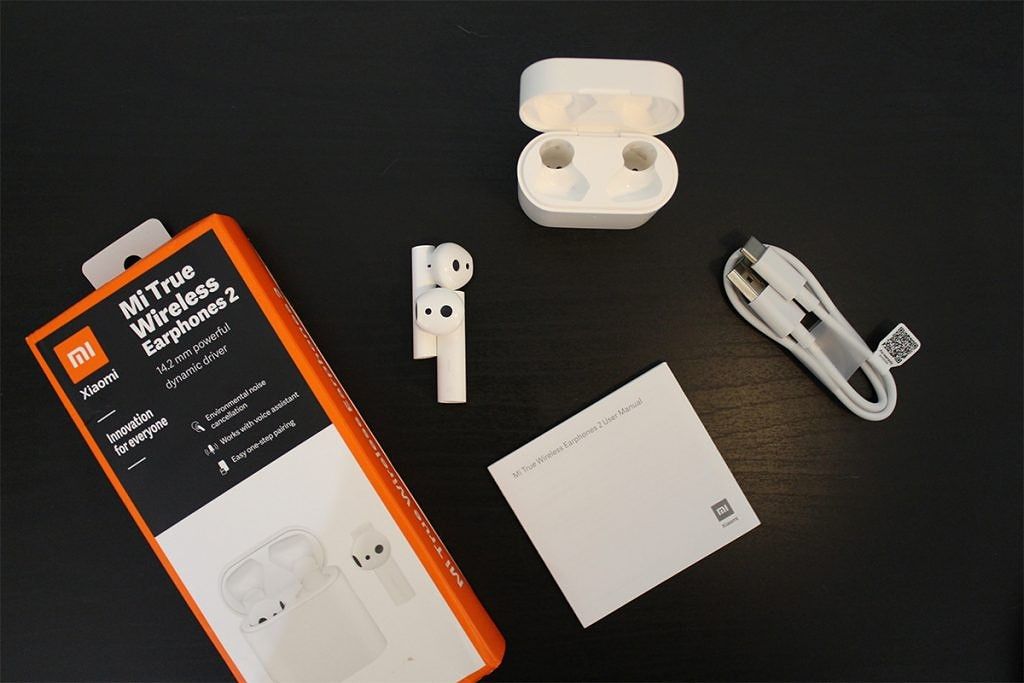
Since the Mi True Wireless Earphones 2 don’t feature silicone tips, they offer no noise isolation. This means that even at high volumes, you’re able to hear almost everything that’s going on around you which doesn’t lend to a pleasant listening experience when you’re out and about. On top of that, when you’re playing music at over 60% volume, there’s significant sound leakage and everyone in a one-meter radius can hear what you’re listening to. This could prove to be annoying for the people around you, making the earphones bothersome to use in public spaces unless you keep the volume low.
In terms of build quality, I have no complaints with Xiaomi’s premium TWS earphones, other than the fact that it doesn’t feature any IP rating. This is disappointing since even Xiaomi’s budget-centric Redmi Earbuds S features an IPX4 rating.
Features
The Mi True Wireless Earbuds 2 isn’t as feature-rich as other TWS earphones in this price range. The pairing process for the earphones is quite simple as you just need to press and hold the function button for 2 seconds. After this, the LED indicator on the case starts blinking and the earphones are ready to be paired with your device. Reconnecting with a previously connected device is as simple as pulling out the earphones from the case and putting them in your ears. The pairing process is even simpler if you’re using a Xiaomi/Redmi device, as it just requires you to open the lid near the device. When you do so, a pop-up will appear on your home screen and you just need to follow the instructions to get connected.
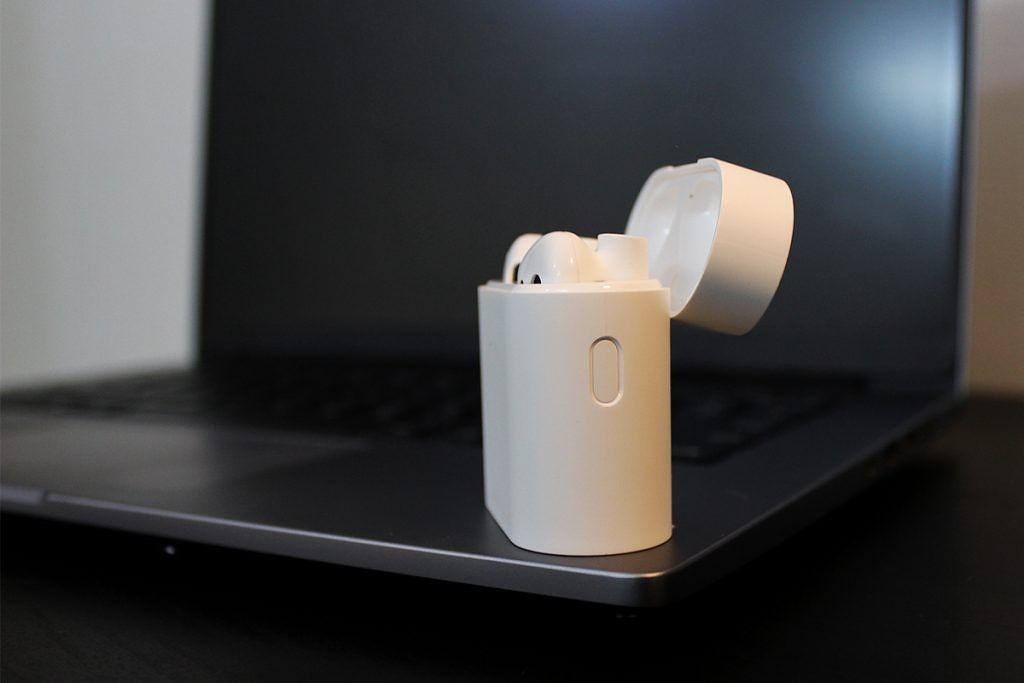
Interestingly, the Mi True Wireless Earphones 2 also let you connect each earbud with a different device. To do so, you’ll need to place one of the earphones in the case and then follow the regular pairing process with the first device. Once the earbud is paired, you can follow the same process for the next earbud to connect to the second device. However, before you use this feature, you’ll need to need to clear the connection history of each earphone. You can clear the connection history by placing the earbuds in the charging case and holding the function button for 10 seconds. The indicator LED will blink red and white to confirm that the connection history has been cleared.
Unlike the Redmi Earbuds S, Xiaomi’s premium TWS earphones feature touch controls for music playback and calls. Both the earbuds have a small touch-sensitive area towards the top of the stem that can be tapped twice to control all of the features. You can answer incoming calls or end an ongoing call by double-tapping on either earbud, tap twice on the right earbud to play/pause music, and double tap on the left earbud to bring up the voice assistant of your choice. If you’re using a single earphone, however, you’ll only be able to play/pause music using the gesture. Since the earbuds feature a proximity sensor, you can also play/pause music by pulling one earbud out. In my experience, all the touch gestures worked as intended but the earphones took a noticeable amount of time to register the input.
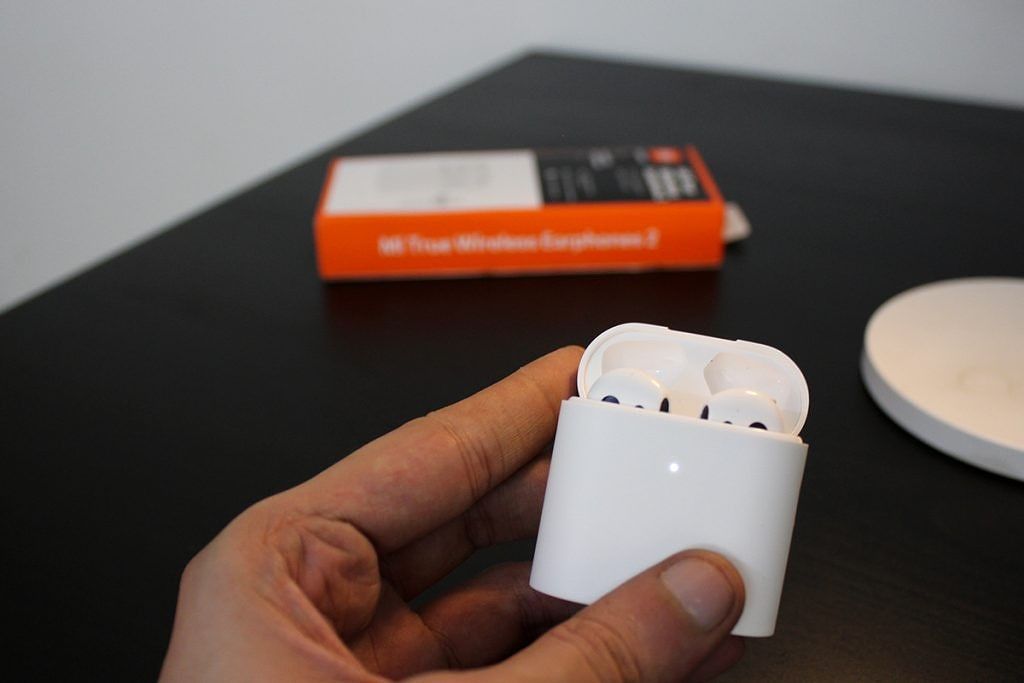
For connectivity, the Mi True Wireless Earphones 2 supports Bluetooth 5.0. Unlike the Redmi Earbuds S, Xiaomi’s premium earbuds support three Bluetooth codecs — SBC, AAC, and LHDC — with the latter making a prominent appearance in Xiaomi’s marketing for the earphones. The earphones also offer environmental noise cancellation for voice calls. The functionality offered by the Mi True Wireless Earphones 2 is pretty standard for TWS earphones in this price range, but it doesn’t offer a low-latency gaming mode that’s found on several of its competitors and the Redmi Earbuds S. It also doesn’t include gestures to adjust volume or switch tracks, which could be a deal-breaker for some of you.
Audio Quality
The Mi True Wireless Earphones 2 feature 14.2mm dynamic drivers, and Xiaomi claims that the earphones offer a high-end audio experience. However, the earphones don’t quite live up to Xiaomi’s claims. Before I proceed any further, I’d like to clarify that since we all perceive sound differently, you might not agree with some of my observations about the audio quality.
Playlist
- Hometown — French 79
- Teardrop — Massive Attack
- Safety — Gashi (ft. DJ Snake)
- Panda — Meute
- Time Goes By — Kupla
- Seven Nation Army — The White Stripes
- Mad World — Gary Jules (ft. Michael Andrews)
- The Blower’s Daughter — Damien Rice
- Tadow — FKJ
- Rockstar — Post Malone (ft. 21 Savage)
- Young Folks — Peter Bjorn and John
- Wasted Years — Iron Maiden
- Purusha — NVDES
- Parallel Jalebi — Four Tet
- Who We Want to Be — Tom Day
I listened to the same playlist that I used for the Redmi Earbuds S review, and I instantly noticed that the Mi True Wireless Earphones 2 sounded much better than the budget-centric earphones. But that was expected given the price difference between the two. Xiaomi’s premium TWS earphones offered much better vocal clarity and a wider sound stage, which meant that I could easily differentiate between all the different instruments played in Meute’s Panda. Bass, however, wasn’t as punchy as that of the Redmi Earbuds S and the mid/high frequencies often overpowered the lower notes.
The earphones got quite loud at max volume, but the overpowering high frequencies made the listening experience a bit painful during a few songs. While the audio reproduction was quite satisfactory for a pair of earphones in this price range, the lack of noise isolation due to the design left a lot to be desired. Even while listening to music in my room, I could constantly hear my AC droning away amidst the Delhi heat, and that leads me to believe that the earphones will perform worse in noisier environments. And as mentioned earlier, turning up the volume meant that everyone around me could hear what I was listening to, which eventually ended up annoying my brother who was trying to work in peace.
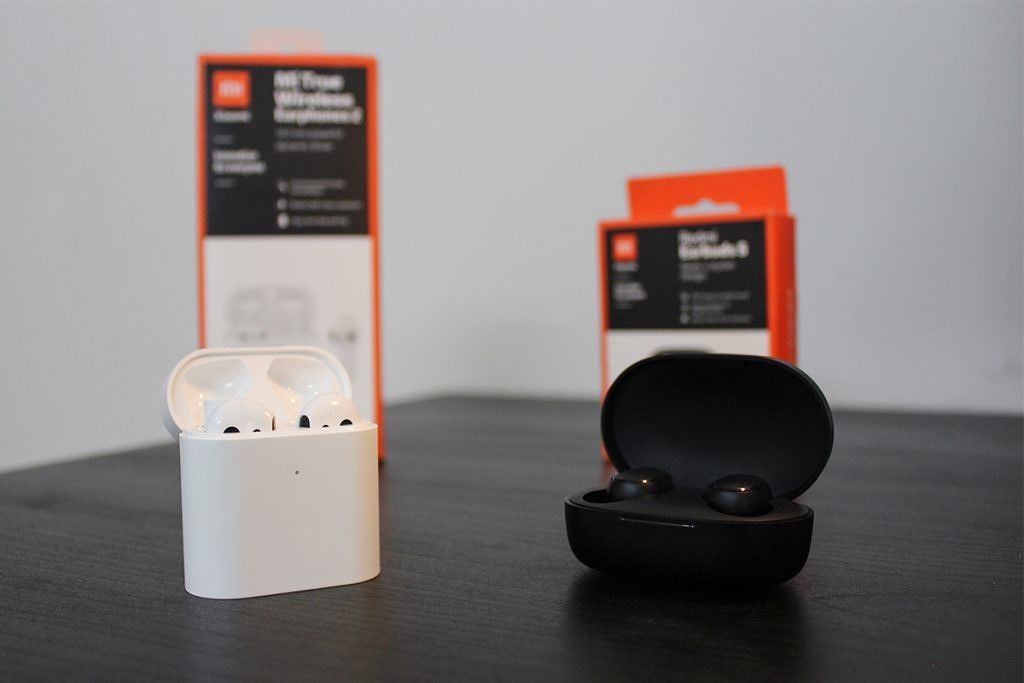
All of the testing was done using the SBC and AAC codecs and I wasn’t able to test the performance using the high-quality LHDC codec. Even though this article points out that Google was bringing LHDC support to all Android 10 devices, I wasn’t able to find LHDC support on any of my devices. Upon further research, I found that codec isn’t quite popular and is only supported by a few Xiaomi and Huawei devices. Tushar from our team confirmed that the Redmi K20 Pro and Redmi Note 9 Pro included support for the codec so, if you have one of these devices, you might be able to improve the audio performance of the Mi True Wireless Earphones 2 even further. Most other users will have to stick with the SBC and AAC codecs.
As far as call quality is concerned, I faced no issues while taking calls with the Mi True Wireless Earphones 2. Its dual-microphone setup ensured that my voice sounded clear on the other end, albeit slightly compressed, and the environmental noise cancellation ensured that the earphones didn’t pick up any unwanted noise from the background. Overall connectivity was also solid and the earphones didn’t disconnect even if I left my phones in a different room.
Battery Life
The Mi True Wireless Earphones 2 pack in a 30mAh battery in each earphone and a 250mAh battery in the charging case. Xiaomi claims that the earphones can be used for up to 4 hours on a single charge but, in my testing, I found that the earphones didn’t last more than 3 hours and 40 minutes at 80% volume. Turning up the volume to 100% while listening to music dropped the battery life to about 3 hours and 20 minutes.
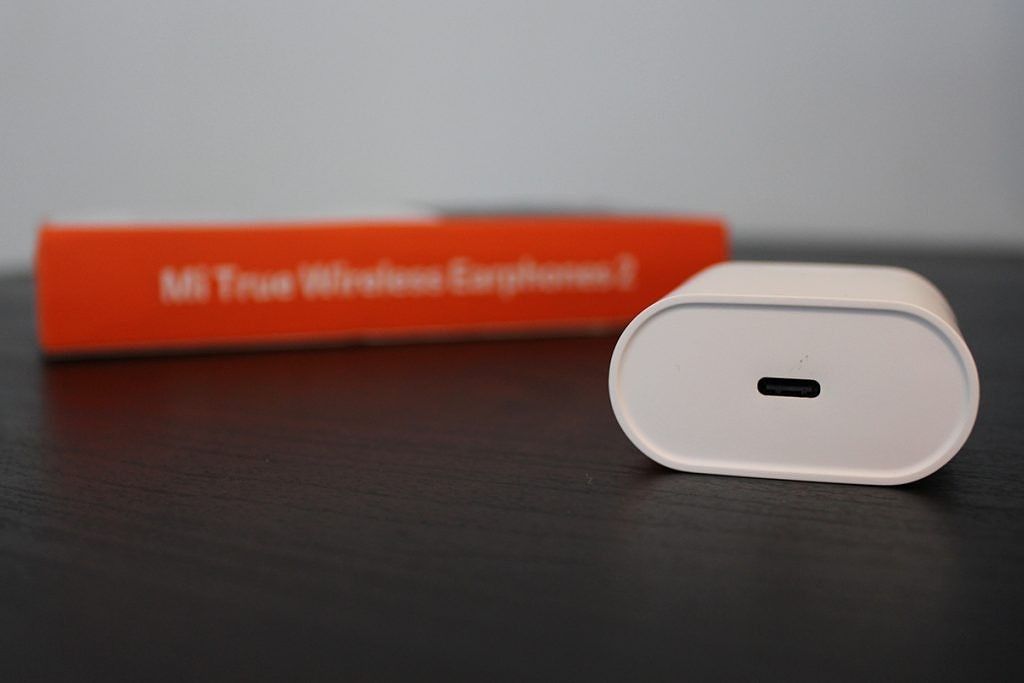
Once the battery is drained out, you can use the case to charge the earphones back up about three times over. This gives us a total playback time of about 11 hours, which is significantly lower than Xiaomi’s 14-hour playback rating. Charging the earphones from 0-100% using the case took about 40 minutes and the case itself took about an hour and a half to get back to full. The battery life is just about average for a pair of earphones in this price range, however, the faster charging speed will let you squeeze out some more playtime in daily use.
Conclusion
If you’re in the market for a pair of TWS earphones in the sub-₹5,000 price range, then the Mi True Wireless Earphones 2 isn’t the best option you can go for. Its noise isolation is poor, which greatly affects the overall audio quality, the battery life is just about average, the LHDC support isn’t useful if you don’t have a supported device, and you can’t really use the earphones at above 60% volume without annoying the people around you. On top of that, the earphones don’t feature a low-latency gaming mode, volume controls, or a track switching gesture.
In comparison, Xiaomi’s budget-friendly Redmi Earbuds S actually presents a better overall deal. Even though they don’t sound as good, they’re less than half the price, offer better noise isolation, feature IPX4 water resistance, and even include a low-latency gaming mode. If you’re not comfortable using earphones that feature a silicone ear tip and would much rather prefer a design similar to the Mi True Wireless Earphones 2, you can also consider the Realme Air Buds which are priced at ₹3,999 and offer similar battery life and audio performance, along with a couple of additional features like wireless charging support, a low-latency gaming mode, and a gesture that lets you skip to the next track.
Buy the Xiaomi Mi True Wireless Earphones 2: Amazon || Mi.com
This article contains affiliate links, which will net XDA a small commission if you purchase a product from clicking a link.
The post Xiaomi Mi True Wireless Earphones 2 TWS Review: Good sound limited by bad design and missing features appeared first on xda-developers.
from xda-developers https://ift.tt/384stNT
via IFTTT

Aucun commentaire: